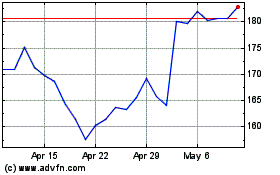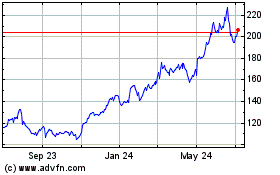Qualcomm's Profit Tumbles as Royalty Disputes Continue -- 3rd Update
April 25 2018 - 7:21PM
Dow Jones News
By Ted Greenwald
Qualcomm Inc. said its profit plunged 52% from a year earlier as
it dealt with a tangle of challenges, including Apple Inc. and
Huawei Technologies Co. continuing to withhold royalties for using
the company's patents.
The San Diego-based chip maker reported a profit of $363 million
for its fiscal second quarter. Revenue rose 4.9% to $5.26
billion.
The chip maker's shares were up 1.8% in after-hours trading. The
stock finished Wednesday's session down 0.4% at $49.75, below its
price of $53 a year ago and well below the $79 a share offered by
Broadcom Inc. in an unsuccessful takeover effort that ended in
March.
The results included a $310 million charge resulting from the
company's efforts to save $1 billion in expenses by 2019. That
program recently resulted in 1,500 layoffs in California.
Further cost cuts will be made "over the next few months,"
Qualcomm finance chief George Davis said in an interview.
Qualcomm said revenue from the sales of chips used in mobile
devices rose 6% to $3.9 billion, continuing their steady growth in
recent quarters.
Qualcomm's revenue from licensing patents, though, tumbled 44%
to $1.26 billion, amid fallout from the company's lengthy disputes
with Apple and Huawei, which have withheld billions of dollars in
royalty payments. That part of the business typically contributes
more than half of Qualcomm's pretax earnings.
Patent-licensing revenue will decline further in the months
ahead, Qualcomm said on a conference call with analysts. For the
current fiscal third quarter, it forecast lower revenue in that
division by 10% to 27% from a year earlier. Some of the expected
decline is due to terms of a revised licensing agreement with
Samsung Electronics Co., the company said, and some is attributable
to lower-cost agreements originally negotiated in China that are
being rolled out world-wide.
Qualcomm leads the market in chips used in smartphones. Its
products manage communications in some iPhones and they form the
heart of many Android devices. As a holder of important patents on
cellular technology, Qualcomm collects a royalty on nearly every
smartphone sold world-wide, regardless of whether they include
Qualcomm chips.
But the company in recent years has been beset by one challenge
after another, capped by Broadcom's $117 billion hostile bid in
November that was to become a relentless distraction throughout the
first quarter. The Trump administration in March scuttled
Broadcom's overture to protect Qualcomm's leadership in the
next-generation cellular technology known as 5G.
Now Qualcomm faces several tough tasks: Complete its purchase of
Dutch automotive chip maker NXP Semiconductors NV, a deal that is
stalled in China's regulatory approval process; slash $1 billion in
expenses to meet its profit goals; and settle its disputes with
Apple and Huawei.
"We're executing on the plan we laid out that leads to our 2019
target" of between $6.75 and $7.50 in adjusted per-share earnings
for that fiscal year, Chief Executive Steve Mollenkopf said in an
interview.
Qualcomm is banking on its acquisition of NXP to immediately
contribute $1.50 to its adjusted per-share earnings and broaden its
product line, potentially reducing its dependence on royalties. The
deal has passed muster in eight countries, but Chinese authorities
are giving it a close look amid escalating trade tensions between
the U.S. and China.
The company is "optimistic" about getting approval from China's
Ministry of Commerce, also known as Mofcom, Mr. Mollenkopf said on
the conference call with analysts. But "the environment is
obviously quite difficult from a geopolitical point of view, at
least right now."
He said "the issue is probably more related to the higher-level
discussions between the countries as opposed to any individual
issue related to Mofcom."
Qualcomm and NXP recently extended the deadline for completing
the deal to July 25. "If it doesn't get done, we're going to move
on to another approach," Mr. Mollenkopf said.
Should the deal fall through, Qualcomm has pledged to buy back
enough of its own shares to boost earnings by an equivalent amount.
The buyback would be a "very large program" amounting to $20
billion to $30 billion, Mr. Davis said on the call.
But that wouldn't address the strategic reasons for buying the
automotive specialist, which Qualcomm has said would open a path to
markets it expects to be worth $77 billion by 2020.
In the conference call, Mr. Mollenkopf said Qualcomm has a
backlog of $4 billion in automotive contracts with companies
gearing up for cars enabled for 5G cellular technology in 2021.
Qualcomm reported per-share earnings of 80 cents on an adjusted
basis, omitting share-based compensation and other items. Analysts
had expected 70 cents a share on $5.19 billion in revenue,
according to a survey by Thomson Reuters.
Write to Ted Greenwald at Ted.Greenwald@wsj.com
(END) Dow Jones Newswires
April 25, 2018 19:06 ET (23:06 GMT)
Copyright (c) 2018 Dow Jones & Company, Inc.
QUALCOMM (NASDAQ:QCOM)
Historical Stock Chart
From Mar 2024 to Apr 2024

QUALCOMM (NASDAQ:QCOM)
Historical Stock Chart
From Apr 2023 to Apr 2024
